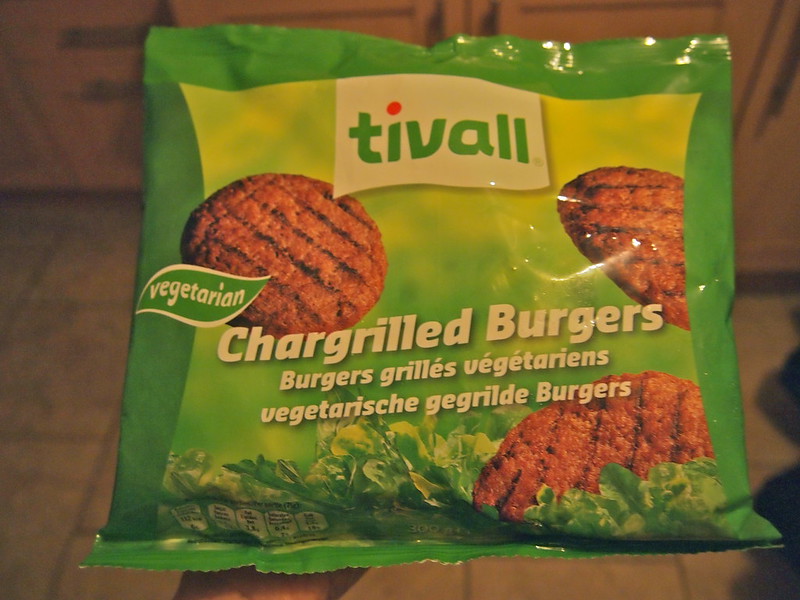
In my continued exploration of food-grade protein design, yesterday we tried: Tivall Vegetarian Burgers. I obtained this from Whole Foods on High Street Kensington (where they did not have Quorn, but they did have a number of other “meatless” meat-alternatives. This Tivall Burger is also the same brand of veggie burger patty that is used in the jewish shops around Stamford Hill.
Name: Tivall Vegetarian Chargilled Burgers (“Chargrilled burgers made form lightly seasoned soya and wheat proteins”).
Ingredient list: Rehydrated Soya and Wheat Proteins (72%) (contains Gluten), Onion, Vegetable Oil, Egg White Powder, Salt, Yeast, Pea Fibres, Potato Starch, Flavourings, Stabilizers (Sodium Alginate, Guar Gum), Malt Extract, Onion Powder, Garlic Powder, Spices, Calcium Phosphate, Vitamin C, Vitamin B3 (Niacin), Zinc Oxide, Ferric Diphosphate, Vitamin E, Vitamin B5 (Pantothenic Acid), Vitamin B6, Vitamin B2 (Riboflavin), Vitamin B1 (Thiamin), Folic Acid, Vitamin B12.
According to William Shurtleff & Akiko Aoyagi’s “History of Soybeans and Soyfoods in the Middle East”, in an 1995 Interview in SoyaScan Notes, Daniel Chajuss (of Hayes General Technology Co. Ltd, who has done a lot of work on Soy in the USA and Israel) said that Tivall is one of the 3 major manufacturers of meat alternatives in Israel (The others are Soglowek (aka Zoglabeck/Zoglovek/Zoglowek) and Shamir Food Industries Ltd with 50% of the Israeli (non-export) market. He suggests that Israeli consumers (even non-kosher and non-vegetarians) buy these vegetarian products because they are convenience products, and kosher diners automatically stay kosher by eating vegetarian food.
As for the interesting part, the interview also mentions the origins of Tivall – traced back to a Dr Michael (Micha) Shemer and Saul Katzen. Saul Katzen was the first person to make meat alternatives from extruded soy flour in patty form, but the soy flour product (fines from non-toasted white flakes sifted out prior to alcoholic extraction) was apparently not tasty enough and also gave people some intestinal gas. The soy flour was bought from Chajuss’ company, and Chajuss apparently urged Katzen to buy soy protein concentrates instead of soy flour and run the concentrates through extrusion equipment. Although Katzen had the equipment, he stuck to soy flour because he felt that soy flour was less wasteful. Chajuss believed that the use of soy flour led Katzen’s company into bankruptcy which was very sad, and for a long time before it happened Chajuss had been giving Katzen a lot of soy flour for free.
After that Michael Shemer came onto the scene, having left University of Illinois, he worked for Miles Laboratories which had purchased Worthington Foods, working on a citric acid project. When he was fired by MIles in the late 1970s he joined an Israeli company named Pedco which made many kinds of food products, and Shemer developed new processes for making meat analogs. In 1983 Tivall, a company located on a kibbutz in northern Israel bought Pedco. It had been established and incorporated solely for the purpose of purchasing Pedco and its activities. Dr Shemer was granted several international and israeli patents on his processes which use reducing agents to soften gluten, but it is speculated that Tivall no longer uses the Shemer patents, instead using a 1956 Hartman/Worthington patent which is now in public domain – and which is what the other company Shamir is also using now.
Tivall’s vegetarian ‘meat alternatives’ apparently start with wheat gluten and use a reducing agent such as sodium sulfite or ascorbic acid (low pH) to make the gluten soft. A 1956 patent issued to Warren Hartman and assigned to Worthington Foods describes how to soften gluten by adding soy flour or soy protein. Their recipe seems to be a matter of food chemistry. Perhaps not as high-tech or exciting as I had expected but interesting to know exactly what I’m going to be eating.

Tivall Burgers with Mash topped with Fried Capers

We tried both frying them and baking them to see which would turn out better. I would say that baking them is infinitely better, frying does not impart the usual “browning” effects you might expect on them, but instead dries the insides of the patties out. Baking is extremely optimal. These patties were probably made to be baked.

The texture and the taste of these are excellent. So far, they have truly surpassed my expectation – complex and with a good bite to them. I would certainly eat this again – I think I even prefer these over normal meat burgers.
Next – for the sake of food exploration and SCIENCE – I will endeavour to try all the other Vegetarian/Meat-free Burgers including the Quorn Burger and Linda McCartney Vegetarian Quarter Pounder Burger. I was also interested in trying other meat-free burgers from UK supermarkets’ own housebrands such as Tescos, Sainsburys, Asda, and Morrisons – however! It seems that from my preliminary research that Tivall is apparently already the key supplier of meat-free alternatives for all these UK supermarket house brands! The sources seem flaky so I will have to dig a bit deeper. I would like to verify this and to see if there is a difference in products between the large retailers here. Tivall is apparently also very well established in many other countries in Europe, supplying some of the largest retailers in Netherlands, Israel, Germany, Sweden and Italy.





